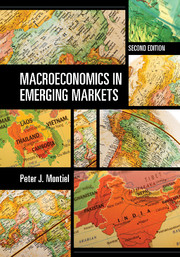Book contents
- Frontmatter
- Contents
- Preface
- PART 1 THE MACROECONOMIC FRAMEWORK
- PART 2 A BENCHMARK MACROECONOMIC MODEL
- PART 3 PUBLIC FINANCE AND MACROECONOMIC PERFORMANCE
- PART 4 MONETARY INSTITUTIONS AND MONETARY POLICY
- PART 5 EXCHANGE RATE MANAGEMENT
- 16 Equilibrium Real Exchange Rates
- 17 The Benchmark Model with Floating Exchange Rates
- 18 Exchange Rate Regimes
- 19 Managing an Officially Determined Rate
- PART 6 THE FINANCIAL SECTOR AND MACROECONOMIC PERFORMANCE
- PART 7 VARIETIES OF EMERGING-MARKET CRISES
- Index
- References
18 - Exchange Rate Regimes
Published online by Cambridge University Press: 05 June 2012
- Frontmatter
- Contents
- Preface
- PART 1 THE MACROECONOMIC FRAMEWORK
- PART 2 A BENCHMARK MACROECONOMIC MODEL
- PART 3 PUBLIC FINANCE AND MACROECONOMIC PERFORMANCE
- PART 4 MONETARY INSTITUTIONS AND MONETARY POLICY
- PART 5 EXCHANGE RATE MANAGEMENT
- 16 Equilibrium Real Exchange Rates
- 17 The Benchmark Model with Floating Exchange Rates
- 18 Exchange Rate Regimes
- 19 Managing an Officially Determined Rate
- PART 6 THE FINANCIAL SECTOR AND MACROECONOMIC PERFORMANCE
- PART 7 VARIETIES OF EMERGING-MARKET CRISES
- Index
- References
Summary
We saw in Chapter 3 that the avoidance of persistent real exchange rate misalignment should be an important macroeconomic objective for emerging economies. The most important policy decision that a country can make in pursuit of this objective concerns the management of the nominal exchange rate. And in managing the nominal exchange rate, the most fundamental decision that has to be made is the choice of exchange rate regime.
The considerations that govern the choice of exchange rate regime are subject to influence by the surrounding domestic and international macroeconomic environment. In the context of emerging economies, an important aspect of that environment is capital account liberalization. As we will see in Chapter 22, technological and institutional developments in the international economy, as well as capital account liberalization in many emerging economies, has caused many of these economies to become strongly integrated with world financial markets. This development has important implications for macroeconomic management in such countries, not least because, as we have seen, the well-known impossible trinity of open-economy macroeconomics implies that perfect international capital mobility, monetary autonomy, and an officially determined exchange rate cannot coexist. The implication is that capital account liberalization may place restrictions on the types of exchange rate arrangements that are feasible for emerging economies.
- Type
- Chapter
- Information
- Macroeconomics in Emerging Markets , pp. 421 - 447Publisher: Cambridge University PressPrint publication year: 2011



